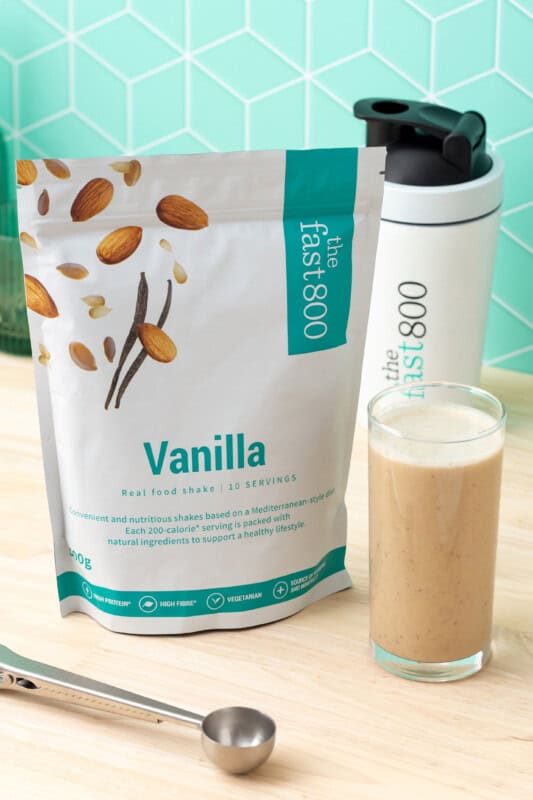- Consume 800 high-quality calories daily for 2 to 12 weeks.
- Focus on balanced nutrition, variety, and satiety to stay on track.

Burn fat by flipping the metabolic switch
We rely on two fuel sources: glucose and fat. Regular eating provides a steady glucose supply for energy, with excess stored as fat if not burned off.
During fasting or reduced carbohydrate intake, glucose runs out, and the body switches to burning stored fat for fuel—a process known as ‘flipping the metabolic switch’.

Improve insulin resistance by giving up snacking
Consistently high blood sugar from sweet or carb-heavy meals damages arteries and nerves and affects your pancreas, which produces insulin. The hormone insulin regulates blood sugar by moving it into muscle cells for energy. In insulin resistance, muscles struggle to use this energy, diverting it to fat storage instead. This leaves you craving snacks, gaining weight and feeling hungry, despite eating.
More than a diet programme
-
Education on science-based lifestyle best practices
-
Easy and delicious nutritionist-developed recipes
-
Tailored exercise and meal plans
-
Personalised tracker and exclusive community
-
FREE 7-day trial, start today!

Weight loss and fasting nutrition
-
Keep you full and satisfied
-
No added sugar or simple carbs
-
High in protein, fibre and quality fats
-
100% vegetarian and made from natural ingredients
-
Essential vitamins and minerals

Try the Programme for free
Sign up today and your 7-day free trial begins immediately. Week 1 of your programme will start on: Monday 10th November
Do you need help with different goals?

The New 5:2
Looking for an effective, gradual way to lose weight and keep it off, long-term?
-
Regular intermittent fasting
-
Low-carb Mediterranean-style recipes
-
Effective, gradual way to lose weight

The Way of Life
Looking for long-term maintenance of weight and metabolic health?
-
Ideal for weight maintenance
-
Mediterranean-style recipes
-
Long term approach for metabolic health
How does The Very Fast 800 diet plan work?
The Very Fast 800 was designed to combine fasting and the principles of a Mediterranean-style diet to achieve healthy, quick weight loss. It works by reducing your calorie intake to induce a metabolic switch from burning carbohydrates as fuel, to burning fat instead. This process has been shown to result in weight loss fast, in addition to other health benefits. Our Programme has been designed by nutritionists and Health Coaches to bring you meal plans, exercises videos and community support to help make your rapid weight loss journey as easy and enjoyable as possible.
How many calories can you eat on The Very Fast 800?
The Very Fast 800 diet is based around eating 800 quality calories per day. It’s vitally important to prioritise low calorie, nutrient-dense foods that are high in protein, healthy fats and fibre when weight loss is your goal. Meal plans, like the ones on our Programme, do all the planning for you to ensure you’re properly nourished during a calorie deficit so you can achieve rapid weight loss while enjoying delicious foods. We also recommend you eat plenty of low calorie, non-starchy vegetables alongside all meals without counting calories.
Do you feel hungry on an 800-calorie diet?
Despite eating fewer calories, many people find that they are satisfied on The Very Fast 800 diet. Although you may experience hunger in the first few days, once your body has flipped the metabolic switch your appetite is likely to decrease. This is because your body is burning fat, experiencing fewer blood sugar spikes and is suppressing the hunger hormone, ghrelin. Prioritising protein and fibre-rich foods will also help to limit cravings and make fast weight loss more manageable, as these macronutrients help to reduce gastric emptying and increase satiety between meals.
How much weight will I lose?
If you’re looking for quick weight loss, then this is the diet for you. The DIAMOND study, performed by Dr Clare Bailey Mosley and Oxford University, found that those who followed an 800 calorie, low carb, Mediterranean-style diet averaged a weight loss of 9.5kg after just 8 weeks. The results also showed promise in the diet being used as a natural treatment for those with type 2 diabetes, with a significant drop in blood pressure and blood sugars during the study. Take a look at some of our members’ extreme weight loss stories to hear from real people who have already made the change.
How long can I follow this fast weight loss diet for?
This quick weight loss diet is required to be followed for a minimum of two weeks and for no longer than 12 weeks. Thereafter, we recommend following either a less restrictive intermittent fasting plan, or a generally moderately low-carb Mediterranean-style diet.
Who can follow The Very Fast 800 diet?
Quick weight loss diets like The Very Fast 800 diet are for those who want to lose weight fast, reduce blood sugar levels or reverse type 2 diabetes. That said, as with any diet, you should speak to your usual healthcare provider before trying a new diet or lifestyle. For example, we do not recommend a rapid weight loss diet like this one if you are pregnant, breastfeeding or underweight.
Is rapid weight loss healthy?
You may have been taught that slow and steady weight loss is healthiest, but that is a common myth. Studies have shown that rapid weight loss can be extremely effective, depending on your goals. It’s associated with better improvements in insulin resistance, and lipid and glycemic profiles. Plus, it helps you stick to a journey longer by having more sustained motivation from quicker rewards for efforts.
Can I exercise on The Very Fast 800 diet?
We encourage exercise, regardless of what diet you follow. It’s essential for maintaining a healthy weight and physique, and is supportive in rapid weight loss efforts. If you want to lose weight fast, we recommend 10-20 minutes per day of combining HIIT training, incidental exercise or resistance training. The Fast 800 diet plans all include exclusive ‘beginner’ to ‘advanced’ exercise videos to follow from the comfort of your own home, all guided by our team of personal trainers and fitness experts.
Should I have weight loss shakes on this diet?
If you want to lose weight quickly, weight loss shakes like The Fast 800 meal replacement shakes and protein shakes are ideal for supplementing your nutrients on busy days when cooking a balanced meal might not be possible. Though we always advise that ‘real’ food is best, they’re made with natural ingredients and are a good source of healthy fats, fibre and protein, sure to fill and energise you until your next meal. What’s more, they’re all low calorie, at around200 calories per serving, so they’re totally suitable for fasting days on The Very Fast 800 diet plan.
What happens after I complete the 12 week programme?
By following The Fast 800 diet plans, you should gain the tools and knowledge you need to go forwards and maintain your hard-earned results. For continued weight loss support after completing the fast weight loss 12-week programme, we recommend transitioning into The New 5:2 diet, which is a longer-term intermittent fasting diet. Alternatively, The Way of Life plan is there to help you maintain your results long term, with no time limits and no calorie counting. Sign up to your 7-day free trial to get started today.

